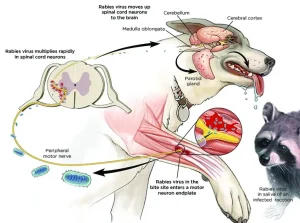Overview
Diagnosis
At the time a potentially rabid animal bites you, there is no immediate way to confirm whether the rabies virus has entered your body. Bite marks may not always be visible, and early symptoms rarely appear right away. Your doctor may order several tests to look for evidence of the virus, but these tests often need to be repeated because rabies can take time to show up in the body. If there is any chance that you were exposed, doctors generally recommend starting treatment quickly to stop the virus before it reaches the nervous system.
Treatment
Once a rabies infection is fully established, there is no effective cure. Although a very small number of people have survived, the disease is almost always fatal. This is why starting preventive treatment immediately after a suspected exposure is critical.
Treatment for people bitten by animals with rabies
If an animal known to carry rabies bites you, you will begin a series of injections designed to stop the virus from taking hold. If the animal cannot be located, your medical team will determine the level of risk based on the type of animal involved and the circumstances of the bite.
Necessary shots may include:
-
A fast-acting injection called rabies immune globulin, given as soon as possible after the bite if you have never been vaccinated before. This is usually injected near the bite site.
-
A series of rabies vaccines to help your immune system recognize and fight the virus. People who have not been vaccinated before typically receive four doses over 14 days. Those previously vaccinated receive two doses within the first three days.
Determining whether the animal that bit you has rabies
In some cases, doctors and public health officials can determine whether the animal that bit you actually has rabies before you begin treatment. If the animal is shown to be healthy, preventive shots may not be required.
The process varies depending on the situation:
-
Pets and farm animals: Cats, dogs, and ferrets can be observed for 10 days. If they remain healthy, they did not have rabies, and treatment may not be necessary. Other domestic animals are reviewed individually with guidance from your doctor or local health officials.
-
Wild animals that can be captured: Animals such as bats can be tested by examining their brain tissue. If tests confirm they are not infected, you will not need rabies shots.
-
Animals that cannot be found: If the animal cannot be located, your doctor and local health department will assess the risk. In some cases, it is safest to assume the animal had rabies and begin treatment. In other situations, the risk may be low enough that shots are not required.
Advertisement

